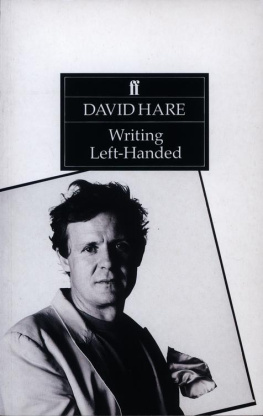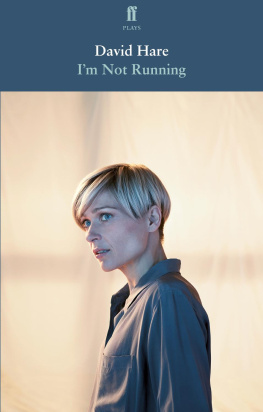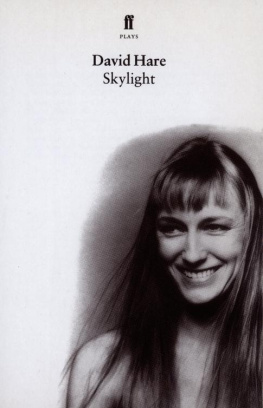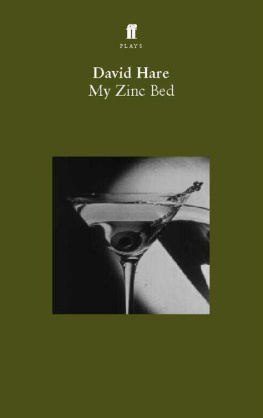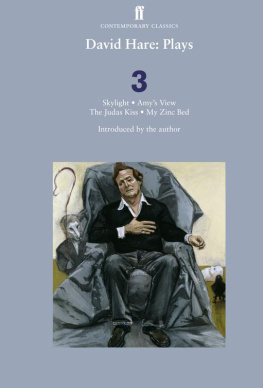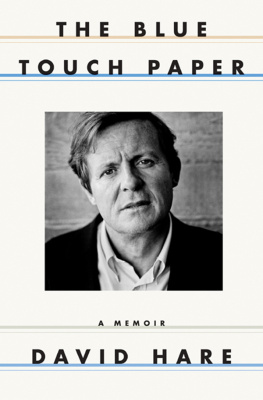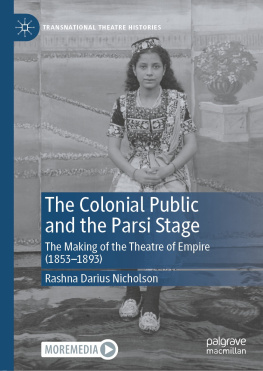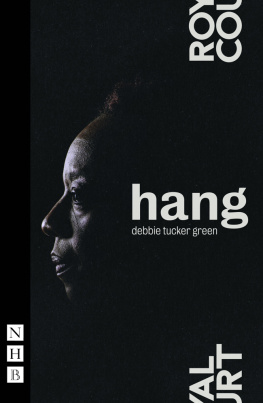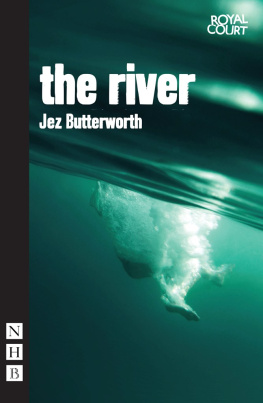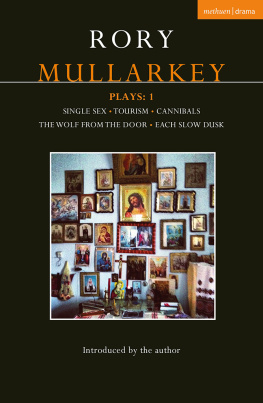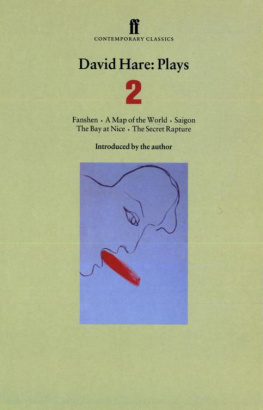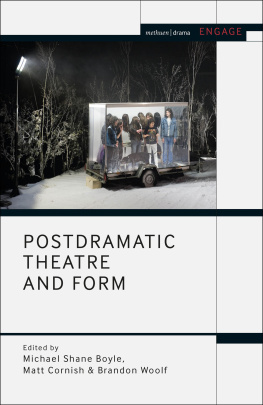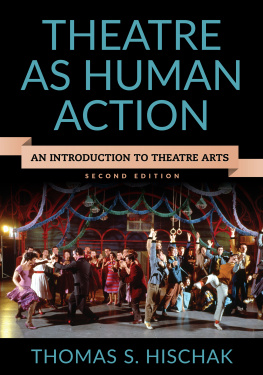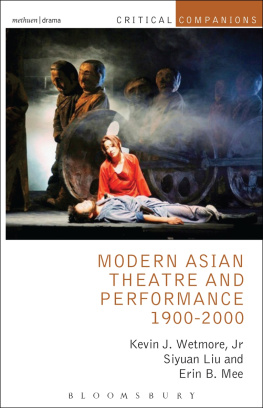It always amuses playwrights when writers from other disciplines discover for themselves how hard it is to write a play. Yesterdays playbills are marked with the names of some of this centurys most distinguished poets and novelists who suddenly found the ground soft underfoot when condescending to the theatre. The form is, for some reason, uniquely deceptive. Most good theatre writing looks pretty easy. A good play seems to pass at such speed and with so little appearance of effort that novelists, exhausted by a more cumbersome form, fall to thinking that the whole thing must depend on some trick. I have even heard novelists threaten to dash a play off. But the strange, necessary combination of vitality on the surface and power below wave and tide, if you like is harder than it looks. It is a mistake ever to write a play without giving your whole life to it. It can seldom be done left-handed.
This collection of essays is from my own left hand. I write prose very rarely. I have not written consistently for one publication, and a healthy proportion of what I submitted has been rejected by the people who asked for it. I explain elsewhere in this book that I discovered at the age of twenty-one that I had a facility for writing dialogue. But sentences which I intend purely for the page still look peculiar to me. I cant wait to hear them spoken out loud, preferably by somebody else, who is pretending to be somebody else again. Through my own carelessness, a number of unpublished pieces have been lost. I was asked to introduce the BedsideGuardian in 1986, but the result was thought too controversial for publication. Liberal newspapers in my experience invite you to be sceptical about everything except liberal newspapers. In the period after they unprotestingly betrayed her to the Treasury Solicitor, the Guardian found the words Sarah Tisdall very hard to set up in type. A long article about the Falklands War was not accepted by the TimesLiterarySupplement, this time because it was not possible to say certain things about the Prime Minister. The FinancialTimes found no place for an article they had requested on politicians use of language. Perhaps these editors were right. One unpublished piece is recovered here, however. It is an essay about Nick Bicts opera TheKnife. This was killed by Esquire who accidentally added insult to injury by enclosing an internal memo from a senior editor who said the piece did not really work. Again, I am sure Esquire was correct. But, by a pleasant irony, I could not help noticing they planned to pay me more for writing an article about the opera than I had earned from directing the opera itself.
By chance, in the week after I had finished assembling this collection, I flew to Budapest where I attended an international writers conference, sponsored by the Wheatland Foundation. Two days before we arrived, Imre Nagy, the most eminent victim of the Russian repression in 1956, was taken from his unmarked grave and re-buried with honour after a public ceremony in Heroes Square. Listening to the admirable speeches by writers from the Middle East and South Africa, it was clear that in countries ruined by war or dictatorship all the usual questions about art and politics easily resolve themselves. In Israel novelists and poets effectively are the opposition, at least to some of their governments more extreme policies. Yet the English writers were at the same conference the subject of a familiar attack from a literary critic, a fellow countryman who wished to argue that in Britain people had very little to complain about, and that looking proportionately at the horrors of the world, playwrights in particular would do better to celebrate the quality of life they enjoyed than to go on moaning about its few and occasional shortcomings. He argued that writers in England felt themselves powerless because they had sacrificed what he called their universality in order to emphasize everything which is dark and depressing in modern life.
This is so common and confused a view that it is hard to know how to unpick what is truly a tangle of misapprehensions. The first mistake is to imagine that British writers, at least of my acquaintance, feel themselves in any way marginalized, or indeed that they wish to have any greater influence on the affairs of the nation than they have already. In my experience, they do not wish more than any other citizens to bring about the fall of governments, or to force laws onto the statute book. One of the great pleasures of writing for the theatre in this country is that the ideas you express can be taken so seriously and enter so smoothly into the currency of political discussion. If the theatre may be said to lack influence at all, it is more likely to be down to the quality of the work it produces than to any inherent prejudice against it in the population at large. The audience is there and waiting, if you have something sufficiently urgent to say and if a massive if, in the life of this government you are able to command the resources with which to say it. Indeed, if you want to understand the social history of Britain since the war, then your time will be better spent studying the plays of the period from TheEntertainer and SeparateTables through to the present day than by looking at any comparable documentary source.
Furthermore there is something mean and patrician in the proposition that in countries which enjoy the right of dissent, it is the duty of writers to refrain from using it; as if freedom were not a right, but a privilege. Why should people fight so hard for this right if they are then to be told that it is immature to exercise it? In the company of so many writers who had been persecuted in their own countries, it became clear to me that writers, whether they intend to or not, serve much the same role in free as in totalitarian societies; they remind their audience of an alternative and perhaps more profound way of looking at experience than would otherwise be available. The degree of passion and skill with which they do this, and the effect they then have, may depend either on their circumstances or, goodness knows, on their character. But in each country the job ends up essentially the same. In writing about TheKnife I introduce a huge subject into which I can make only the slightest inroad, but I try to suggest that morale-building orthodoxies are just as prevalent and just as insistently propagated in the West as in the East.
As to the charge that British writers in general stress unduly what is most disturbing in modern life, then I have to assume from the response of the audience to the variety of plays they see that a number of them share this interest, and identify with some of the dissatisfactions they see expressed. For myself, I was drawn into working in the theatre in what I wrongly took to be an apocalyptic time. In the opening lecture of the book, which is in part a memoir of my one-time tutor Raymond Williams, I describe a mood in the late sixties which had me decide that I wanted to set about dramatizing the crisis I then believed Britain to be in. In the second lecture, I describe some of the hard lessons I learnt in trying to make this impulse work in practice. Over the twenty years that I have continued writing, almost everything in my approach has changed. I have become fascinated by the formal problems of film and theatre, which once had no interest for me; I have moved from running small travelling groups to writing and directing on the largest stages I could find; and I have, in recent years, been drawn less to attacking the iniquities of a particular social system than to illustrating the dilemmas of all those who still struggle with the idea of what a good life might be.

